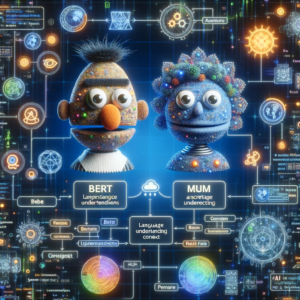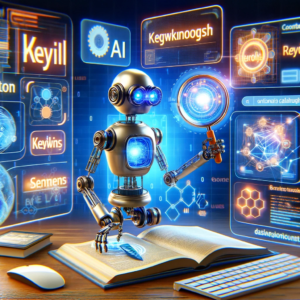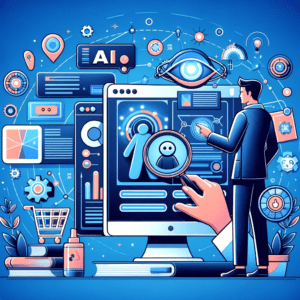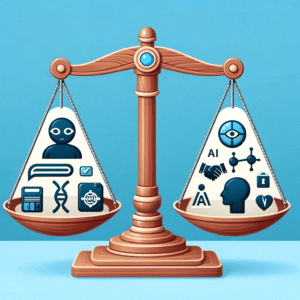Embracing AI in SEO: How to Optimize for Future Algorithms
In this blog, we delve into the transformative role of Artificial Intelligence (AI) and Machine Learning (ML) in the world of Search Engine Optimization (SEO). We explore how these technologies are not just reshaping SEO strategies but are also setting the stage for future algorithm changes. Understanding and adapting to these advancements is crucial for businesses looking to stay ahead in the digital landscape.
Key Takeaways
- AI and ML are becoming central to how search engines operate and rank content.
- Adapting to AI-driven SEO requires a deep understanding of these technologies.
- Businesses must focus on data-driven strategies and user experience to succeed in an AI-dominated SEO world.
Table of Contents
- The Rise of AI in Search Engines
- Understanding AI Algorithms: BERT and MUM
- Data-Driven SEO: Harnessing AI for Better Insights
- AI in Keyword Research and Content Creation
- User Experience (UX) Optimization Through AI
- Ethical Considerations and AI Transparency
- Preparing for Future Algorithm Changes
The Rise of AI in Search Engines
Artificial Intelligence (AI) has revolutionized the way search engines operate, leading to a seismic shift in search engine optimization (SEO) strategies. In the early days of search, engines relied on relatively simple algorithms based on keyword matching and link analysis. However, as the digital world grew in complexity and user expectations evolved, these traditional methods proved inadequate for delivering relevant and accurate search results.
Enter AI – a game-changer for search engines. AI enables search engines to understand and interpret vast amounts of data more effectively than ever before. This advanced capability allows for a more nuanced understanding of user queries, going beyond mere keywords to grasp the intent and context behind searches. For instance, AI algorithms can differentiate between the search for a ‘jaguar’ the animal and ‘Jaguar’ the car brand, based on the context provided by the user’s search history and other factors.
The impact of AI on search engine algorithms and ranking factors has been profound. Modern search engines like Google now use AI-driven algorithms, such as RankBrain, which utilize machine learning to interpret search queries and deliver more personalized and relevant search results. These algorithms constantly learn and evolve based on new data, meaning that what works for SEO today might not work tomorrow.
This dynamic landscape requires SEO strategies to be more adaptive and sophisticated. SEO professionals must now consider factors like user intent, the contextual relevance of content, and the overall user experience. This shift towards AI-driven search engines emphasizes the need for a deeper understanding of how AI works and its implications for SEO.

Understanding AI Algorithms: BERT and MUM
Google’s integration of AI algorithms like BERT (Bidirectional Encoder Representations from Transformers) and MUM (Multitask Unified Model) has been a significant leap forward in the search engine’s ability to understand and interpret user queries. These models represent a substantial advancement in natural language processing (NLP), a branch of AI focused on the interaction between computers and human language.
BERT: A Revolution in Understanding Context
BERT, introduced in 2019, marked a turning point in Google’s search algorithm capabilities. Unlike its predecessors, BERT can analyze the context of each word in a search query, rather than just the query as a whole. This means BERT is exceptionally adept at understanding the nuances and subtleties of language, such as the importance of prepositions and the context they provide to a sentence. For example, BERT can distinguish the difference in meaning between “bank statement” and “statement bank,” understanding how the position of words can alter the query’s intent.
MUM: Taking Contextual Understanding Further
Building on BERT’s foundation, Google introduced MUM in 2021, designed to be 1,000 times more powerful. MUM not only understands language and context at a higher level but also has the ability to understand and process information across different languages and formats (like text, images, and more). This means MUM can provide answers to complex, nuanced questions by analyzing information from a variety of sources and formats, breaking language barriers. For instance, MUM could help a user plan a trip by consolidating information from websites in multiple languages, considering local weather conditions, cultural norms, and travel restrictions, all from a single, multifaceted query.

Implications for SEO
The implementation of BERT and MUM significantly alters how SEO professionals approach content creation and optimization. The focus shifts towards creating content that answers questions in a natural, conversational manner, considering the various ways a question might be phrased. Understanding user intent becomes more crucial than ever, as these AI models prioritize content that best matches the user’s search intent and context. This evolution signals a move away from keyword stuffing and towards more nuanced, user-focused content that aligns closely with the sophisticated capabilities of AI algorithms like BERT and MUM.
Data-Driven SEO: Harnessing AI for Better Insights
In the realm of AI-driven SEO, data plays a pivotal role. The integration of AI and machine learning algorithms has transformed data from mere information into valuable insights, fundamentally changing the approach to SEO.
The Importance of Data in AI-Driven SEO
The core of AI’s functionality in SEO revolves around its ability to process and analyze large volumes of data efficiently. This capability enables search engines to identify patterns and trends that human analysts might overlook. In the context of SEO, this means understanding what types of content perform well, how users interact with different elements of a website, and what search queries are most effective in driving traffic.
AI algorithms are trained using vast datasets, which they use to learn and make predictions. For SEO, this implies that the more high-quality data you can provide, the better the AI can understand and optimize your content for search engine algorithms. This data-driven approach is crucial for staying ahead in an increasingly competitive digital landscape.

Tools and Techniques for Collecting and Analyzing SEO Data with AI
Several tools and techniques are available to leverage the power of AI in collecting and analyzing SEO data:
- SEO Analytics Platforms: Tools like Google Analytics, SEMrush, and Ahrefs use AI to provide insights into website traffic, keyword rankings, backlink profiles, and competitor analysis. These platforms help in identifying which parts of your SEO strategy are working and where improvements are needed.
- AI-Powered Keyword Research Tools: AI algorithms can analyze search trends and user behavior to suggest the most effective keywords for your content. This goes beyond traditional keyword research by predicting future trends and suggesting long-tail keywords that could drive targeted traffic.
- Content Analysis Tools: AI-driven content analysis tools can evaluate the quality and relevance of your content. They check for factors like keyword density, readability, and how well your content matches user intent.
- User Experience (UX) Optimization Tools: Tools like Hotjar and Crazy Egg use AI to track user interactions on your website. Heatmaps, scroll tracking, and user recordings provide insights into how users navigate your site, enabling you to optimize for better engagement and conversion rates.
- Predictive Analysis: Advanced AI tools can perform predictive analysis, forecasting future trends in search behavior and market shifts. This allows SEO strategists to stay ahead of the curve, adapting their strategies proactively rather than reactively.
AI in Keyword Research and Content Creation
The integration of Artificial Intelligence (AI) in keyword research and content creation has significantly streamlined and enhanced these aspects of SEO. AI’s capability to analyze large datasets and identify patterns has revolutionized how keywords are researched and how content is created and optimized for search engines.
AI’s Role in Automating and Optimizing Keyword Research
Traditional keyword research methods involve manual searches and rely heavily on intuition. AI transforms this process by automating and optimizing keyword research, saving time and increasing accuracy. AI-powered tools can analyze search engine data, trends, and user behavior to identify the most effective keywords for a specific niche or audience.
These tools go beyond simply finding high-volume keywords; they can uncover long-tail keywords and semantic variations that might be less obvious but highly relevant. This capability is crucial, as it aligns with the way modern search engines, like Google, interpret and process search queries. AI in keyword research ensures a more strategic approach, focusing on relevance and search intent, key factors in today’s SEO landscape.

Using AI Tools for Creating and Optimizing Content
AI’s influence extends to content creation and optimization. AI-powered writing assistants and content tools can help create more engaging and SEO-friendly content. These tools analyze existing content across the web, providing insights on what works well and identifying gaps that your content can fill. They can assist with structuring articles, generating ideas, and even writing drafts that align with SEO best practices.
Furthermore, AI can optimize existing content by suggesting improvements in keyword usage, readability, and structural elements like headings and bullet points. It can also tailor content to specific audience segments by analyzing user data, enabling a more targeted and effective approach.
Content optimization also extends to on-page SEO elements. AI tools can suggest meta tags, image alt texts, and other HTML elements that are crucial for SEO but often overlooked. By automating these aspects, AI not only enhances SEO but also ensures a consistent approach across all content.
User Experience (UX) Optimization Through AI
The optimization of User Experience (UX) using Artificial Intelligence (AI) represents a significant advancement in SEO strategies. AI’s ability to analyze user behavior and preferences has opened new avenues for creating more intuitive and user-friendly websites, which is a key factor in SEO.
Understanding the Role of UX in SEO
UX plays a critical role in SEO as search engines, especially Google, prioritize websites that offer a positive user experience. This includes aspects like website speed, ease of navigation, mobile responsiveness, and overall content accessibility. A website with a strong UX keeps users engaged, reduces bounce rates, and encourages longer session durations, all of which positively influence search engine rankings.

AI-Driven UX Optimization Techniques
- Personalization: AI algorithms can analyze user data to deliver personalized experiences. This could mean displaying content, products, or recommendations based on the user’s past behavior, location, or search preferences.
- Predictive User Behavior Analysis: AI tools like heat maps and session replays help in understanding how users interact with a website. These insights guide improvements in website design and content placement, ensuring that users find what they are looking for quickly and easily.
- Chatbots and Virtual Assistants: Implementing AI-powered chatbots improves user engagement and assistance. They provide instant support to users, answering queries and guiding them through the site, which enhances the overall user experience.
- Accessibility Improvements: AI can assist in making websites more accessible to users with disabilities. This includes optimizing for screen readers, ensuring color contrast ratios are met, and providing alternative text for images.
- Load Time Optimization: AI tools can analyze a website’s performance and suggest optimizations to improve load times. Faster websites offer a better user experience, which is a crucial factor in SEO.
- A/B Testing: AI-driven A/B testing allows for more effective testing of different website elements to see which versions perform the best in terms of user engagement and SEO.
The Impact of AI-Enhanced UX on SEO
Websites optimized for UX using AI not only provide a better user experience but also rank higher in search engine results. AI’s ability to understand and predict user needs and preferences means websites can be tailored more effectively to meet these needs, which is a key factor in SEO success. Additionally, as search engines continue to evolve, they are likely to place even greater emphasis on user experience, making AI-driven UX optimization an essential component of future-proof SEO strategies.
Ethical Considerations and AI Transparency
As AI continues to permeate various aspects of SEO, ethical considerations and the need for transparency in AI-driven algorithms become increasingly important. Ensuring ethical usage and understanding the mechanics behind these AI systems is vital for maintaining trust and integrity in SEO practices.
Ethical Use of AI in SEO
Ethical concerns in AI-driven SEO primarily revolve around data privacy, manipulation of rankings, and content authenticity. With AI’s ability to process and analyze vast amounts of user data, concerns about privacy infringement and data security are paramount. Ethical SEO practices necessitate transparent data handling policies, respecting user consent, and ensuring data is used responsibly.
Manipulating search rankings using AI poses another ethical challenge. Techniques that exploit AI algorithms for unfair advantages, like creating misleading or low-quality content that’s optimized just for search engines, can lead to a poor user experience and undermine the credibility of search results.

AI Transparency in SEO
Transparency in AI-driven SEO tools and algorithms is crucial for building trust. This includes understanding how these tools collect, analyze, and use data, and how they influence search rankings. Transparency is also essential for SEO professionals and content creators to understand how to optimize their content ethically and effectively.
- Algorithmic Transparency: Search engines providing insights into how their AI algorithms work can help SEO professionals adapt their strategies in more informed and ethical ways. While full transparency may not be possible due to proprietary reasons, some level of insight is beneficial.
- Content Authenticity: AI tools should be used to enhance human creativity, not replace it. Ensuring content remains authentic, original, and valuable to the user is crucial. Over-reliance on AI for content generation can lead to a loss of personal touch and user engagement.
- Bias and Fairness: AI systems are only as unbiased as the data they are trained on. Ensuring AI tools in SEO are free from biases and provide fair opportunities for all websites, regardless of size or domain, is essential for an equitable digital space.
The Future of Ethical AI in SEO
As AI continues to evolve, the SEO community must stay vigilant about its ethical implications. This includes advocating for more transparent AI practices, using AI responsibly, and prioritizing user privacy and experience. By fostering ethical AI practices, the SEO industry can ensure that the advancements in technology are aligned with fair and trustworthy search engine practices.
Preparing for Future Algorithm Changes
As AI continues to evolve, preparing for future changes in search engine algorithms is essential for SEO success. Adapting to these changes requires not only an understanding of current AI trends but also a proactive approach to SEO strategy.
Staying Informed and Adaptable
- Continuous Learning: The field of AI is dynamic, with frequent updates and new developments. Keeping abreast of the latest trends, algorithm updates, and best practices is crucial. Regularly attending SEO conferences, following industry blogs, and participating in forums can provide valuable insights.
- Experimentation and Testing: Adopt a mindset of continuous experimentation. Test new tools, strategies, and approaches to understand how changes in AI algorithms might affect your website’s performance. A/B testing and analyzing results can provide actionable insights.
Leveraging AI for Predictive Analysis
- Predictive SEO: Use AI tools for predictive analysis to anticipate future trends and user behaviors. This can guide content strategy, keyword selection, and overall SEO planning.
- Scenario Planning: Prepare for various potential future scenarios based on current AI trends. This includes considering how shifts in AI technology could impact different aspects of SEO, from content creation to technical optimization.
Focusing on Fundamentals
- Quality Content: Despite changes in algorithms, high-quality, relevant, and valuable content remains king. Focus on creating content that genuinely serves the user’s needs and intents.
- User Experience: Enhancing the user experience should always be a priority. A website that is easy to navigate, fast, and mobile-friendly is likely to perform well regardless of algorithm changes.
- Ethical SEO Practices: Adhere to ethical SEO practices. Avoid trying to manipulate rankings through black hat techniques, as these can lead to penalties, especially as AI becomes more sophisticated in detecting such tactics.
Building a Flexible SEO Strategy
- Diversification: Avoid relying on a single SEO tactic or channel. Diversify your approach to include various aspects like on-page SEO, content marketing, social media, and other digital marketing strategies.
- Adaptability: Be prepared to adapt your strategies quickly in response to algorithm changes. Flexibility and responsiveness are key to staying ahead in the ever-evolving SEO landscape.
Collaborating with AI Experts
- Cross-disciplinary Collaboration: Collaborate with AI experts to gain deeper insights into how AI is evolving and how it could impact SEO. This can provide a competitive edge and deeper understanding.
- Investing in AI Skills: Consider investing in AI skills for your team. Understanding the basics of AI and machine learning can provide a better grasp of how these technologies affect SEO.
FAQs
1. How does AI specifically impact SEO today?
AI impacts SEO by improving search engines’ ability to understand and process user queries and website content. It enhances keyword research, content optimization, and user experience. AI-driven algorithms like Google’s BERT and MUM have made search results more relevant and accurate by understanding the context and intent behind queries.
2. Can small businesses without AI expertise still compete in SEO?
Yes, small businesses can still compete in SEO. While AI enhances SEO strategies, the core principles remain the same: creating high-quality, relevant content and providing a good user experience. Small businesses should focus on these fundamentals and can use accessible AI tools for keyword research and data analysis to enhance their strategies.
3. What are some common AI tools used in SEO?
Common AI tools in SEO include AI-powered keyword research tools like SEMrush, content optimization tools like Clearscope, AI-driven analytics platforms like Google Analytics, and user experience tools like Hotjar. These tools help in various aspects of SEO, from content creation to performance analysis.
4. How can I ensure my SEO strategies are ethical in an AI context?
To ensure ethical SEO practices in an AI context, focus on transparency in data usage, respect user privacy, avoid manipulating rankings unfairly, and maintain content authenticity. Adhering to search engine guidelines and prioritizing user experience over exploitation of algorithms is key.
5. What should I focus on to prepare for future AI changes in SEO algorithms?
To prepare for future AI changes in SEO algorithms, stay informed about the latest developments in AI and SEO, adopt a flexible and adaptable SEO strategy, focus on creating quality content, enhance user experience, and invest in learning about AI and its applications in SEO.

